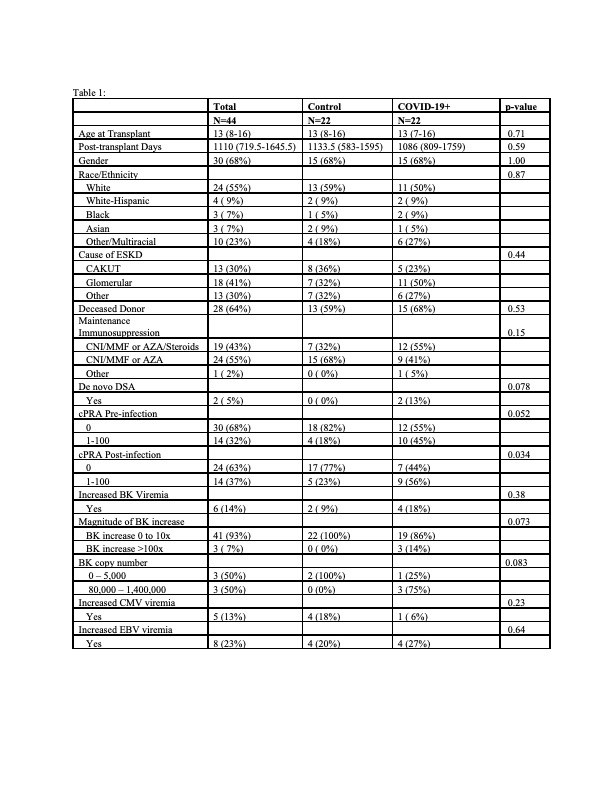Sensitization and BK Viremia; Risk Following Sub-Clinical COVID-19 Infection in Pediatric Kidney Transplant Recipients
1Children's Hospital Colorado, Aurora, CO, 2University of North Carolina, Chapel Hill, NC
Meeting: 2022 American Transplant Congress
Abstract number: 831
Keywords: COVID-19, Kidney transplantation, Pediatric
Topic: Clinical Science » Kidney » 43 - Kidney: Pediatrics
Session Information
Session Time: 5:30pm-7:00pm
 Presentation Time: 5:30pm-7:00pm
Presentation Time: 5:30pm-7:00pm
Location: Hynes Halls C & D
*Purpose: In contrast to high morbidity and mortality of COVID-19 infection (COVIDi) in adult kidney transplant (KT) recipients, these sequelae appear to be muted in the pediatric KT population. Long-term effects of COVIDi in pediatric KT recipients (pKTR), specifically those with absent or mild symptoms, have not been characterized. Thus, we aimed to investigate the impact of subclinical COVIDi on allograft outcomes, specifically allosensitization, and viremias in pKTR.
*Methods: This retrospective 1:1 case-control study investigated COVIDi in pKTR transplanted between January 2016 to November 2021 at our center. Each pKTR with COVIDi, was matched with a control patient (by time of KT). Using laboratory values between March 1, 2020 and December 1, 2021, data was collected following COVIDi to baseline include donor specific antibodies (DSA), panel reactive antibodies (PRA), allograft rejection, and development or intensification of viremias. Descriptive statistics were utilized as well as two-sample t-tests, chi square, and logistic regression for tests of significance.
*Results: 22 patients in our cohort of 135 pKTR experienced subclinical COVIDi. 4 patients (18%) had an increase in BK viremia after COVIDi. Of these cases, 75% resulted in a >100-fold increase in BK viral load, compared to controls experiencing no more than a 5-fold increase. Following COVIDi, the proportion of pKTR with PRA>0 significantly increased compared to controls (p=0.03). Additionally, 2 patients with COVIDi developed de novo DSA versus none in the controls (p=0.078).
*Conclusions: Fortunately, acute morbidity and mortality associated with COVIDi in pKTR is muted compared to adults. However, COVIDi has long-term consequences for the pKTR with marked BK viremia and sensitization, potentially compromising allograft function. Pronounced BK viremia combined with increased risk for sensitization requires delicate adjustments of immunosuppression and anti-viral therapies to optimize patient and graft outcomes. The importance of avoiding these complications of COVIDi could lend additional support to vaccination before and after transplant in the pKTR population.
To cite this abstract in AMA style:
Benz E, Chandran M, Chuita J, McKinnon K, Sikora A, Bock M, Blanchette E. Sensitization and BK Viremia; Risk Following Sub-Clinical COVID-19 Infection in Pediatric Kidney Transplant Recipients [abstract]. Am J Transplant. 2022; 22 (suppl 3). https://atcmeetingabstracts.com/abstract/sensitization-and-bk-viremia-risk-following-sub-clinical-covid-19-infection-in-pediatric-kidney-transplant-recipients/. Accessed July 12, 2025.« Back to 2022 American Transplant Congress

